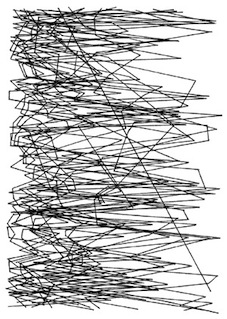Forms of Criticism
Image courtesy of Derek Beaulieu
Thursday 30 June 2016
Parasol Unit, 14 Wharf Road, London N1 7RW
In the Editorial for the first issue of Art-Language (1969) Terry Atkinson raised questions about a possibility of combining creative and critical practice: ‘can this editorial,’ Atkinson wrote, ‘in itself an attempt to evidence some attributes as to what “conceptual art” is, come up for the count as a work of conceptual art?’ Forms of Criticism takes Atkinson’s idea as its starting point to engage with issues of criticism and form and interrogate limits between creative and critical practice.
In poetry, fine art, film making, performance – in the creative sector – we are familiar with and applaud – or tolerate, in the very least – experiments which blur or transgress boundaries of genre, form, or creativity. Similar possibilities of formal experimentation remain significantly underexplored with respect to critical practice, although a growing interest in probing the limits of criticism can currently be observed. Forms of Criticism proposes to think about critical practice as a creative experiment with form in its own right and invites a re-examination of the relationship between research and forms adopted for presenting, communicating, and disseminating it. By considering diverse sites of critical and creative production the project focuses on experimenting with modalities of criticism and ways of addressing formal critical-creative hybridity.
The event brings together artist, curators, writers, critics and scholars addressing questions of hybrid creative-critical forms in theory and practice though talks, performances, screenings, readings and installations. Speakers include: John Beck (IMCC), Kate Briggs (American University in Paris), Eric Cazdyn (University of Toronto), Ducks!, Gary Hall (Coventry University & Open Humanities Press), Peter Jaeger (poet and critic, Roehampton), Kristen Kreider (poet and artist, Royal Holloway), Richard Misek (filmmaker), Simon Morris (Leeds Beckett University), Jo Collinson Scott (musician and musicologist), Marquard Smith (Journal of Visual Culture and Piet Zwart Institute, Rotterdam), and Nick Thurston (artist, University of Pennsylvania and Leeds).
The event is free and open to all but places are limited and booking is essential. For more information about the event and to reserve tickets please go to: http://www.formsofcriticism.net/
For more information, please contact Kaja Marczewska: k.marczewska@westminster.ac.uk
Literary Criticism and the Small Press: A Symposium
Saturday 1 July 2016, 10am-6pm
The Boardroom, University of Westminster, 309 Regent Street, London, WIB 2UW
Literary criticism has historically been practised using three broad models: a close attention to form; a consideration of the way that histories of ideas, identities and social forms are apparent in literary work; a more sociologically oriented consideration of practices of production and reading. From the twentieth century on, while the relations among these, and the prioritising or marginalising of each, shifted and changed, the mutual shaping of literary writing and its means of production has been consistently ignored. In contemporary literary criticism, while much literary critical work combines the first and the second, very little considers all three. Detailed consideration of the way that formal elements are shaped by and interact with the production and dissemination of writing remains almost absent from the discipline. At the same time, the limits of mainstream publishing and the growth of the small press have each been particularly visible since the economic crash of 2008, yet an investigation of the relation between this and the kinds of writing studied and interpreted has not emerged. Literary Criticism and the Small Press: A Symposium aims to draw attention to and investigate this absence through three broad themes. The location of the small press as the site of formal innovation is clear from the end of the nineteenth century, and its role in the dissemination of modernism is well known. How has this relation changed over the last century or so, and what are the interventions or absences in the literary critical work with regard to it? From William Morris to the digital revolution, the relation of the small press to writing has made central the question of materiality. What is the relation between material and linguistic forms? The relation of the small press to the mainstream, the material forms of writing and linguistic innovation are all mediated and determined by the institutions within which they exist — publishing, bookselling, the university, government funding of the arts and universities, and so on. How do these institutions shape what is published, where and for whom?
The symposium will consist of three panels:
Materialities: Nicholas Thoburn; Sophie Seita
Institutions: Claire Squires; Lisa Otty; Nick Thurston; Matvei Yankelevich
Histories: John Wrighton; Matthew Sperling; Stephen Voyce; Richard Price
The event is free, but please book your place here.
The Symposium has been organized by Dr Georgina Colby, Dr Kaja Marczewska and Dr Leigh Wilson as part of the Contemporary Small Press Project, supported by the Institute for Modern and Contemporary Culture, University of Westminster.
For more information please contact: Dr Leigh Wilson: wilsonl@wmin.ac.uk
Photography and the Language of Things

The IMCC’s David Cunningham will be contributing a series of pieces over the next six weeks on the theme of Photography and the Language of Things to the renowned Still Searching blog hosted by our friends at the Winterthur Fotomuseum in Switzerland. The first one has just gone up…
In her short 2010 text “A Thing Like You and Me”, Hito Steyerl traces what she describes as a shift from an “emancipatory practice” that would be tied to the “desire to become a subject” (of, say, politics or history) to the emergence, today, of a “different possibility”: “How about siding with the object for a change? Why not affirm it? Why not be a thing?” This desire to side with the object is one that has been much echoed across large parts of the humanities and social sciences over the last decade. Indeed, from the influential work of Bruno Latour and Bill Brown’s ‘thing theory’, to various species of ‘new materialism’, object-oriented ontology and posthumanism – as well as in its reception by recent art practice – such a turn to the object is rapidly approaching the status of a new doxa for contemporary theoretical work tout court. In this blog I want to explore – in an inevitably rather sketchy way – some questions that are for me provoked by this desire to side with the object, and, in particular perhaps, with what it might mean for an account of the photographic image as a site of continuing debates concerning representation, abstraction and realism. …
Read the rest of the post here.
And more to follow…
Driving Legacy Forward: Erik Kessels’ “Unfinished Father”
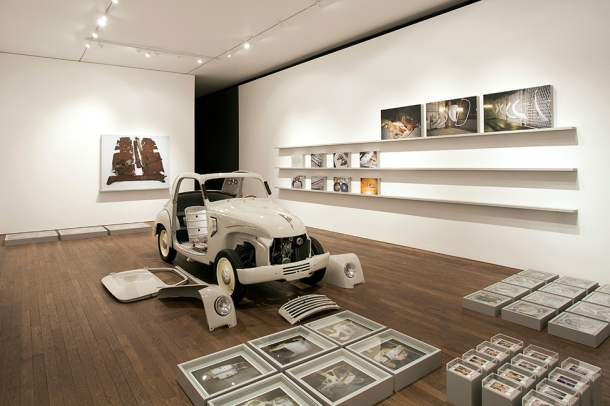
In the first of two collaborations with the excellent blog hosted by the Photographers Gallery in London, Jennabeth Talliaferro, a student on our MA Creative Writing: Writing the City, has contributed a short piece on Erik Kessels’ installation at the Gallery, Unfinished Father.
“Like legacy, photography is an overlapping of the past and present. In Erik Kessels’ work, Unfinished Father, the artist achieves simultaneous representation of these seemingly separate ideas. His father’s dilapidated and gutted Fiat Toppolino is juxtaposed with photographs of car parts orderly displayed. The viewer sees an old car whose former life and purpose are a mere memory.”
You can read the rest of Jennabeth’s piece here.
Conference: The Hypothetical

Saturday 25th-Sunday 26th June 2016
Room UG04, 309 Regent Street, London W1B 2HW
The Hypothetical: Institutions, Fictions, Environments
A hypothesis is literally a placing under, and thus a foundation or basis for an argument. As a foundation, though, a hypothesis is less than concrete; it is a starting point, a premise, a conjecture, a supposition. A hypothesis stands in a provisional relation to the known facts — may, indeed, fly in the face of the facts — and at worst can be described as a mere assumption or guess. A hypothesis, then, is a provocation. It demands investigation, testing, evaluation, perhaps refutation. A hypothesis has expectations.
The purpose of this conference is to interrogate the ramifications of the hypothetical in its philosophical, scientific, technological, historical, literary and artistic forms. How do the fictional, the conjectural, or the notional provide the operational conditions for new knowledge, new social and political forms, and new modes of describing the world? What are the temporalities that govern the hypothetical? How does the hypothetical put pressure on existing forms and practices, within and across the arts and the sciences? Are there limits — organisational, structural, ideological, disciplinary — beyond which the hypothetical collapses into the simply impossible? Or is the impossible an ideological bracketing of the emancipatory potential of the hypothetical? Alternatively, does the hypothetical run the risk of producing hypocriticism, a mode of reflexive and opportunist self-interest that merely reinscribes the position of the hypothesist?
Speakers: Claudia Aradau (King’s College London); Mark Currie (Queen Mary, University of London); Elizabeth Ellsworth & Jamie Kruse (by video link) (The New School, New York City); Mikhail Epstein (Durham University); Greg Garrard (University of British Columbia); John Richard Sageng (University of Oslo); David Wittenberg (University of Iowa).
View the conference programme here
Contact: John Beck j.beck@westminster.ac.uk
The conference is free but it is essential to register via Eventbrite
Experimental Writing @ Carroll / Fletcher: Christian Bök
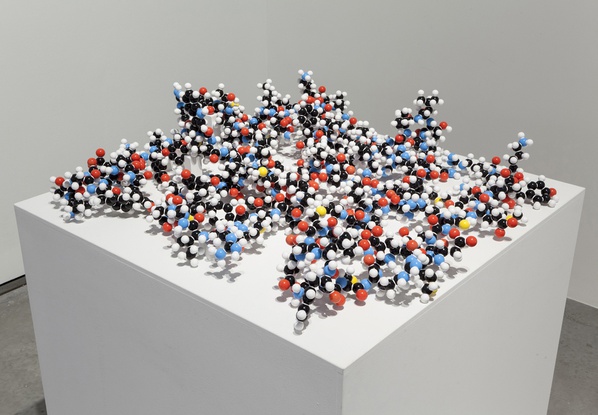
Monday 23 May 2016, 7pm, Carroll / Fletcher, 56-57 Eastcastle Street, London, W1W 8EQ
Tickets £5 available here
Christian Bök, an experimental poet and conceptual artist will discuss the intellectual foundation for his innovative experiment, The Xenotext – a work that required Bök to engineer the genome of an unkillable bacterium so that the DNA of such an organism might become not only a durable archive that stores a poem for eternity, but also an operant machine that writes a poem in response. The presentation will be accompanied by literary readings of poetry, produced in response to his research.
The talk will be followed by a conversation between Christian and the IMCC’s John Beck.
This is the fourth event in the Experimental Writing @ Carroll / Fletcher series. Organised by the Institute of Modern and Contemporary Culture at University of Westminster and Carroll / Fletcher, the series showcases contemporary developments in experimental writing and their relationship to the visual arts.
Christian Bök is a Canadian experimental poet and artist. He is the author of Crystallography (Coach House Press, 1994), a pataphysical encyclopedia nominated for the Gerald Lampert Memorial Award, and of Eunoia (Coach House Books, 2001), a work of experimental literature, which won the Griffin Prize for Poetic Excellence. Bök has created artificial languages for two television shows: Gene Roddenberry’s Earth: Final Conflict and Peter Benchley’s Amazon. Bök is also known for his performances of sound poetry (particularly the Ursonate by Kurt Schwitters). His conceptual artworks, which include books built out of Rubik’s cubes and Lego bricks, have appeared at the Marianne Boesky Gallery in New York City as part of the exhibit Poetry Plastique. Bök is currently a Professor of English at the University of Calgary.
For more information, please contact either:
Kaja Marczewska: k.marczewska@westminster.ac.uk
or Asya Bachelis: asya@carrollfletcher.com
Masterclass with Christian Bök
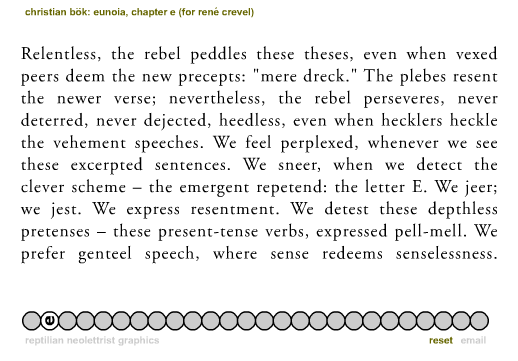
Monday 23 May, 11:00 am-1.30 pm, 309 Regent Street, London W1B 2UW.
We are delighted to announce a Masterclass with Canadian writer Christian Bök. The Masterclass is part of our Experimental Writing series and coincides with an event @Carroll/Fletcher later this month (further details will be available in due course).
This masterclass will introduce some of the techniques of Conceptualism, a school of writing that often uses technical resources on the Internet to explore the aesthetics of “the uncreative”: for example, the readymade writing of the unoriginal text; the mannerist writing of the constrained text; the illegible writing of the unreadable text; and the aleatoric writing of the authorless text. The class explores these four ways of writing so that participants might torque them to their own, otherwise “creative,” purposes.
Participation in the Masterclass is free but places are limited and registration is essential. While priority will be given to postgraduate students (both taught and research) and early career researchers, all applications are welcome!
For further information, please contact Kaja at k.marczewska@westminster.ac.uk
Registration: http://goo.gl/forms/9an5RDI9Y2
Welcome to Carmen Caruso, Junior Visiting Research Fellow
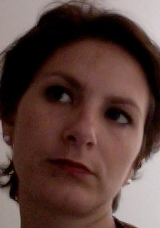
The IMCC is delighted to welcome Carmen Caruso as our visiting research fellow during the Spring and Summer of 2016. Carmen has a Ph.D. in Migration Studies (University of Catania), an MA in Gender Studies (SOAS), and a BA in Political Science (University of Bologna). She is a teaching assistant in Applied Ethics in the Philosophy Department at the University of Calabria (UNICAL). Carmen was a Postdoctoral Research Fellow at the Centre for Gender Studies at the School of Oriental and African Studies (SOAS) where she developed a project on the Lebanese diaspora in the UK from a gender perspesctive. To date, her research has focused on three interrelated areas of inquiry: human mobility (with an emphasis on diasporas from the Arab world), identity and citizenship, aesthetics and the material and performative dimension of culture. Recently she has edited a volume on the city of Jerusalem.
Sexual Violence Against Women: Voice and Representation
Friday 17th June 2016
St Pancras Room, King’s Place, 09:30-17:00
This one-day symposium organised by Dr Georgina Colby and Hannah Camplin aims to bring keynote academics and practitioners in the fields of law, politics, and charities into dialogue with writers, artists, and filmmakers who take up the issues surrounding sexual violence against women in their works. The symposium will open with a keynote address by Professor Jacqueline Rose (FBA, Birkbeck Institute for the Humanities, University of London), titled ‘Feminism and the Abomination of Violence.’ Professor Rose’s keynote address will be followed by a lunchtime keynote paper by Keir Starmer MP, Holborn and St Pancras. There will be two afternoon panels on ‘Sexual Violence, Belief, and Credibility’, and ‘Voice and Representation: Empowering Voice and Enacting Change Through the Arts and Humanities’.
Tickets are priced at £6.00, excluding booking fee (£1.52). All proceeds from tickets sales will go to the Women’s Project at Asylum Aid. Tickets include coffee and refreshments throughout the day.
Tickets are available through Eventbrite.
Contact Georgina Colby for further information: g.colby@westminster.ac.uk.
Mark Amerika, Mobile Phone Film, Immobilité
Wednesday, 11 May 2016, 6:00 pm
Regent St Cinema, 309 Regent St, London W1B 2UW
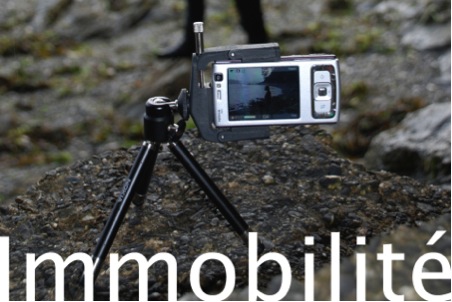
We are delighted to announce the UK premiere of Mark Amerika’s work of early mobile phone video art, Immobilité.
Released in 2009, Mark Amerika’s Immobilité appropriates the stylistic tendencies of the “feature-length foreign film.” The artwork introduces the creative use of subtitles that double as a literary text depicting a future world where the dream of living in utopia can only be sustained by a nomadic tribe of artists and intellectuals living on the edge of apocalypse.
According to Amerika, “Immobilité mashes up the language of auteur-driven ‘foreign films’ with a more amateur video vernacular we now associate with social media platforms like YouTube and Vine.” By experimenting with a low-tech glitch aesthetic associated with pre-HD mobile phone video recording technology as well as more sophisticated forms of motion picture narrative found in European art-house movies, Amerika makes an attempt at interrogating the question: “What is the future of cinema?”
Shot entirely on a Nokia N95 mobile phone in 2007 (before the release of the iPhone), Immobilité was filmed on location in the Cornwall region of England and received support from the University of Falmouth iRES research group, Tate Media, and the University of Colorado Innovative Seed Grant. Solo exhibitions of Immobilité have taken place at the Denver Art Museum, the National Museum of Contemporary Art in Athens, and the Chelsea Art Museum.
For more information on Immobilité, visit immobilite.com
For further information about the event, please contact Kaja Marczewska: k.marczewska@westminster.ac.uk
The film will be introduced by Mark Amerika, in conversation with Chris Meigh-Andrews.
The event is free and open to all. Booking is essential and tickets are available here.
Luxury Book Club discussion on Hangover Square
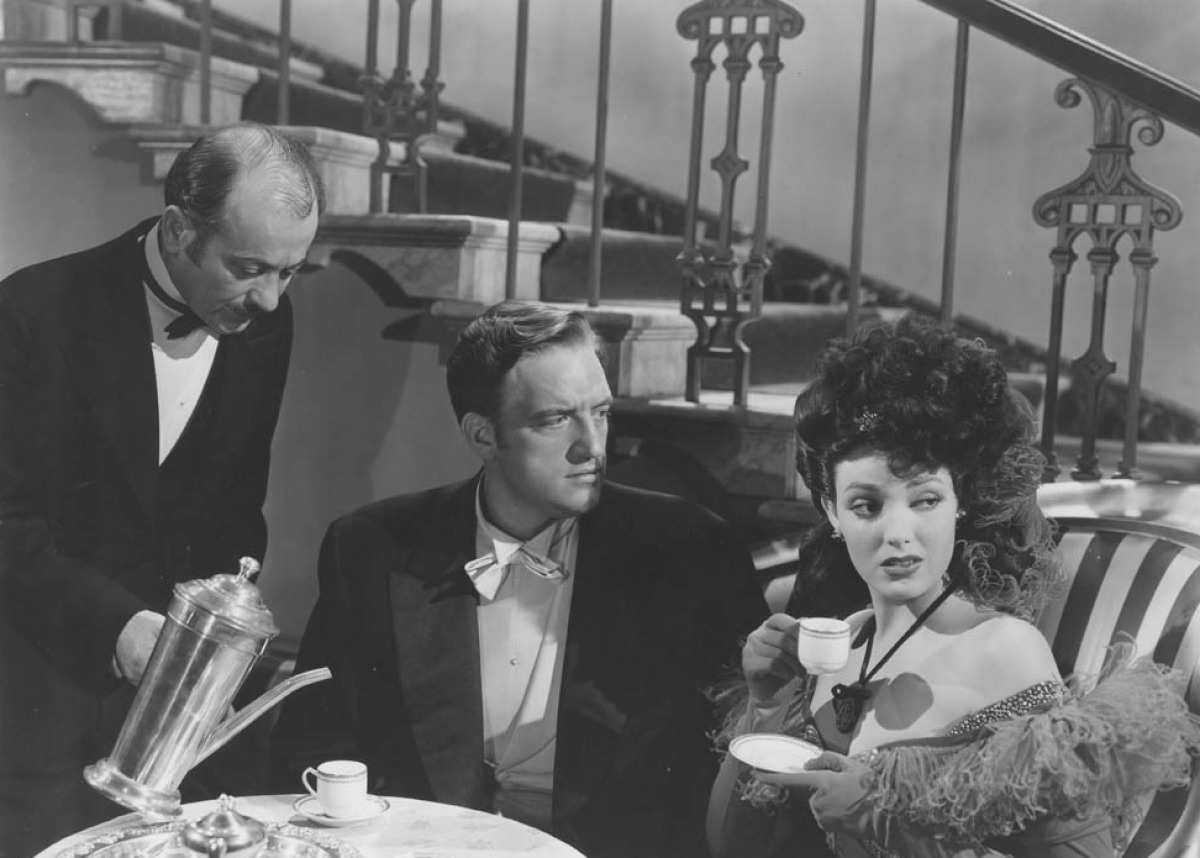
You can listen to a podcast of our own Anne Witchard discussing the novel Hangover Square by Patrick Hamilton for the inaugural meeting of The Luxury Book Club. Other panelists include poet Declan Ryan and actor and playwright Mark Farrelly. Have a listen here.
Artistic Connections Between Animals and Humans lecture
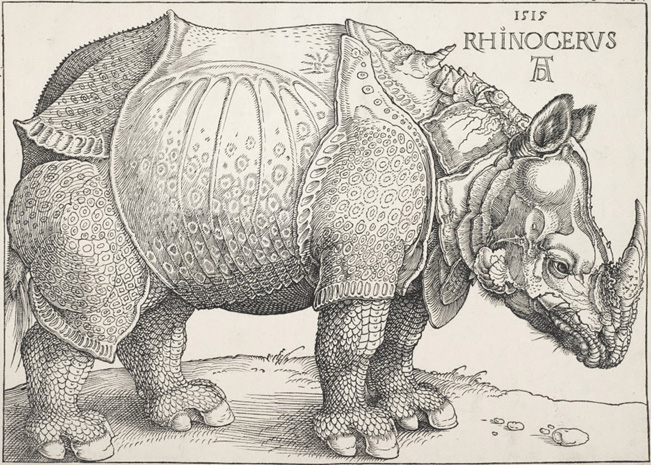
Talita Jenman, who is currently studying on the Institute’s MA in Art and Visual Culture, is giving a lecture on the Artistic Connections Between Animals and Humans at the National Gallery in London on May 9th.
Monday 9th May 2016, 1.00 pm
Salisbury Wing Theatre, National Gallery
Finding the Animal
How have depictions of animals in Western art changed through time, and what might this tell us about the evolving relationship between the human and natural world? This lecture explores the changing concept of both wildness and society and how this has impacted on the ways in which we depict animals.
Talita Jenman is an artist and art historian who previously ran the Arts and Culture Programme at ZSL London Zoo.
Further details here.
Piecing It Together exhibition
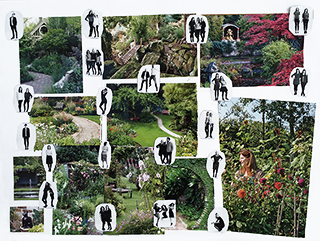
April 29th – July 4th 2016, 9am – 6pm, Monday to Friday
The Conference Centre, St Pancras Hospital, 4 St Pancras Way, London NW1 0PE
“Piecing It Together”
‘Piecing it Together’ is an exhibition of collages and photo-text books produced as part of a participatory art project based at two North London NHS Foundation Trust Acute Day Units for people who have experienced a recent deterioration in their mental health, and facilitated by our own Alexa Wright.
Between January and September 2015 artist, Alexa led weekly workshops for service users at the two day centres. These Art Project workshops offered an opportunity for participants to use collage as a direct, visual means to communicate what they had been through. Some people also continued to work with Alexa on a 1-1 basis to create small photo-text books about their experiences. As well as providing individuals recovering from acute mental difficulties with a means of coming to terms with what happened to them, the project aims to challenge stigma around mental health more generally. Interactions with the people Alexa met during the workshops will form part of her ongoing research towards a new suite of video and sound works reflecting on some of the often surreal, but always very human themes that emerged during the residency.
The exhibition will be accompanied by a Symposium to be held on Thursday 16th June.
Some further details about the project at: http://piecingittogether.org/
Wallpaper: The Shanghai Collection – interview by Anne Witchard

An excellent interview with James H. Bollen, author of Wallpaper: The Shanghai Collection, by our very own Anne Witchard at the Los Angeles Review of Books. As Anne writes in her introduction: “The title of James H. Bollen’s new book — Wallpaper: The Shanghai Collection — makes an ironic gesture towards the materialism and consumerism that drives the ongoing destruction of Shanghai’s domestic heritage. This collection of wallpapers is available only as torn remnants clinging to half-demolished walls. The conceptual framework of this project could not be more apt. The images are grouped according to quotations from the essays of William Morris, genius both of wallpaper design and of a bygone socialist optimism. The peeling layers of bulldozed homes reveal the declining fortunes of successive generations of Shanghai’s shikumen tenants.”
Read the full interview here.
Fotomuseum new website and digital asset management system
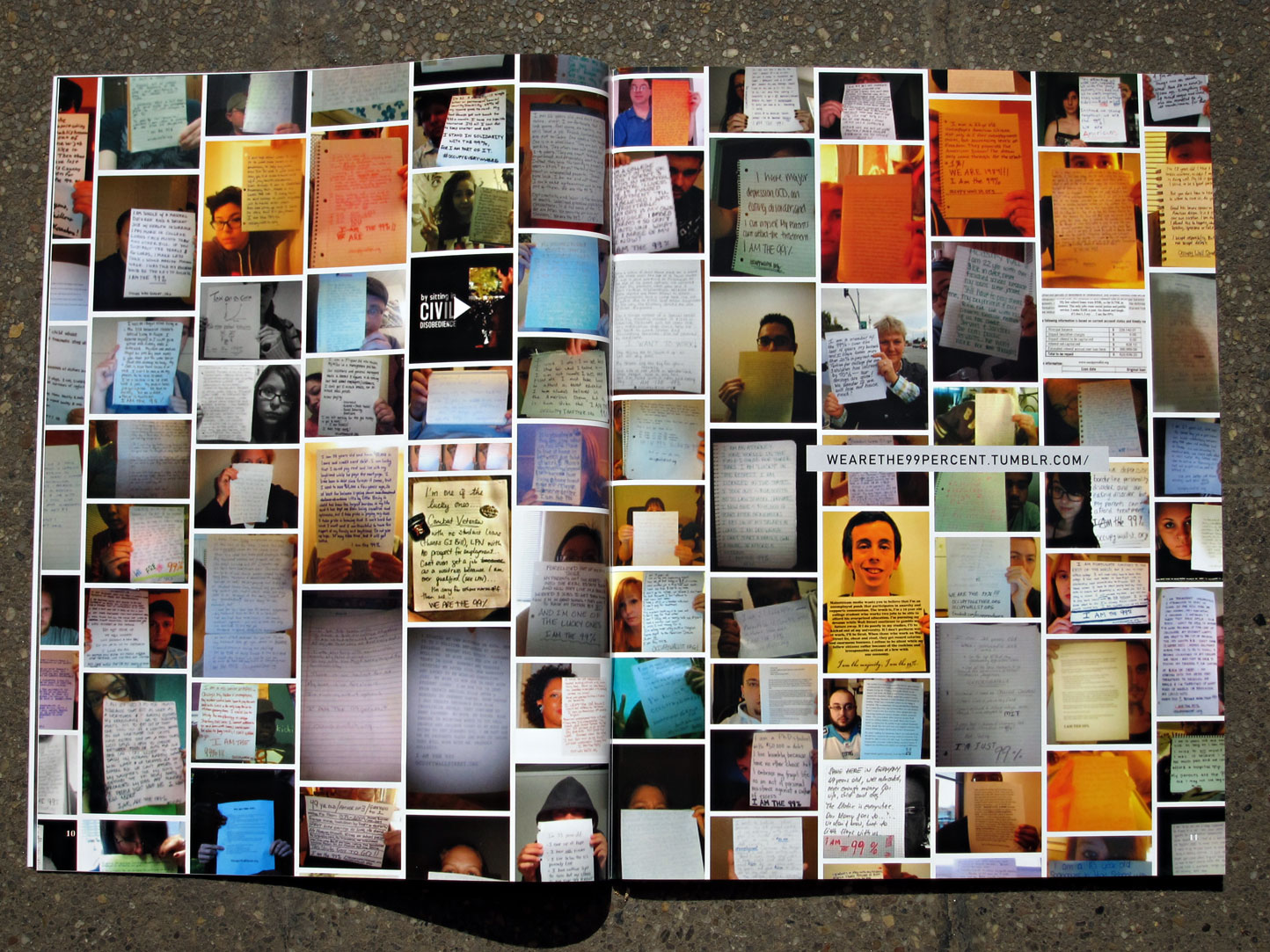
Data Futures @ the IMCC is very proud to report its involvement in Fotomuseum Winterthur’s launching of a new visual identity on February 26th of this year, including the redesign of its website and the building of an innovative digital asset management system.
Photography is changing rapidly, extending its capacities in relation to computational technologies and the power of data communications. No longer defined by the relative singularity of the chemical image, digital photography increasingly mixes still and moving forms and is subject to unpredictable transformation and replication. In the algorithmic age photographic imagery is extensively distributed and shaped by incessant change. Connections and interactions between global systems are becoming dominant factors.
Fotomuseum has decided to respond decisively to these changes by creating a new visual identity adequate to an extended notion of the photographic. Museums now comprise vast digital infrastructures, and central to the project has been the renovation of Fotomuseum’s old website. Together with Simon Davies, the web engineering firm Systemantics was engaged and Fotomuseum’s website has been completely redesigned. It now presents the activities of Fotomuseum more clearly, with a strong emphasis on the visual content of the museum. A variety of social media has been embedded in the site and a video channel launched to archive interviews and presentations conducted at the museum. Fotomuseum has amassed significant content over the years and this can now be accessed through a search function that aggregates results across the whole website. More content from Fotomuseum’s history will be added over the next six months. The final result is a website that is packed full of information, easier to use and more visually engaging for online visitors.
Fotomuseum’s digital content has been managed up until now by multiple IT platforms. Like internet technologies, these platforms are constantly evolving, but they have also created isolated silos of information requiring complex integration if data is to be shared and sustained. Fotomuseum has taken the radical step of moving beyond specific IT products for functions such as the online collection, blogs and the publication archive, and has built a unified fully-linked and sustainable digital asset management system (DAMS). Collaboration with the Data Futures consortium, based at the University of Westminster, enabled automated transformation of data from Fotomuseum’s multiple IT systems into a single corpus which now provides access to Fotomuseum’s many assets for the new website. Data Futures’ open source freizo migration software ensures the sustainability of the Fotomuseum DAMS over many decades, independent of the website. It has built a future-proof foundation for new services such as metadata harvesting by other institutions and interfaces for scholarly research.
Duncan Forbes, Fotomuseum Director, said: “We are very proud of this transformation and believe we’ve designed an identity for Fotomuseum which enhances its reputation as a leading venue for photography, as well as being both playful and intellectually challenging. Furthermore, for a mid-sized museum our digital infrastructure is now one of the most advanced in Europe”.
For further information about the project, please contact Fotomuseum at presse@fotomuseum.ch
Fotomuseum Winterthur Grüzenstrasse 44 + 45 CH-8400 Winterthur + 41 (0)52 234 10 60
Experimental Writing @ Carroll / Fletcher: Kreider + O’Leary with Maria Fusco, March 18th
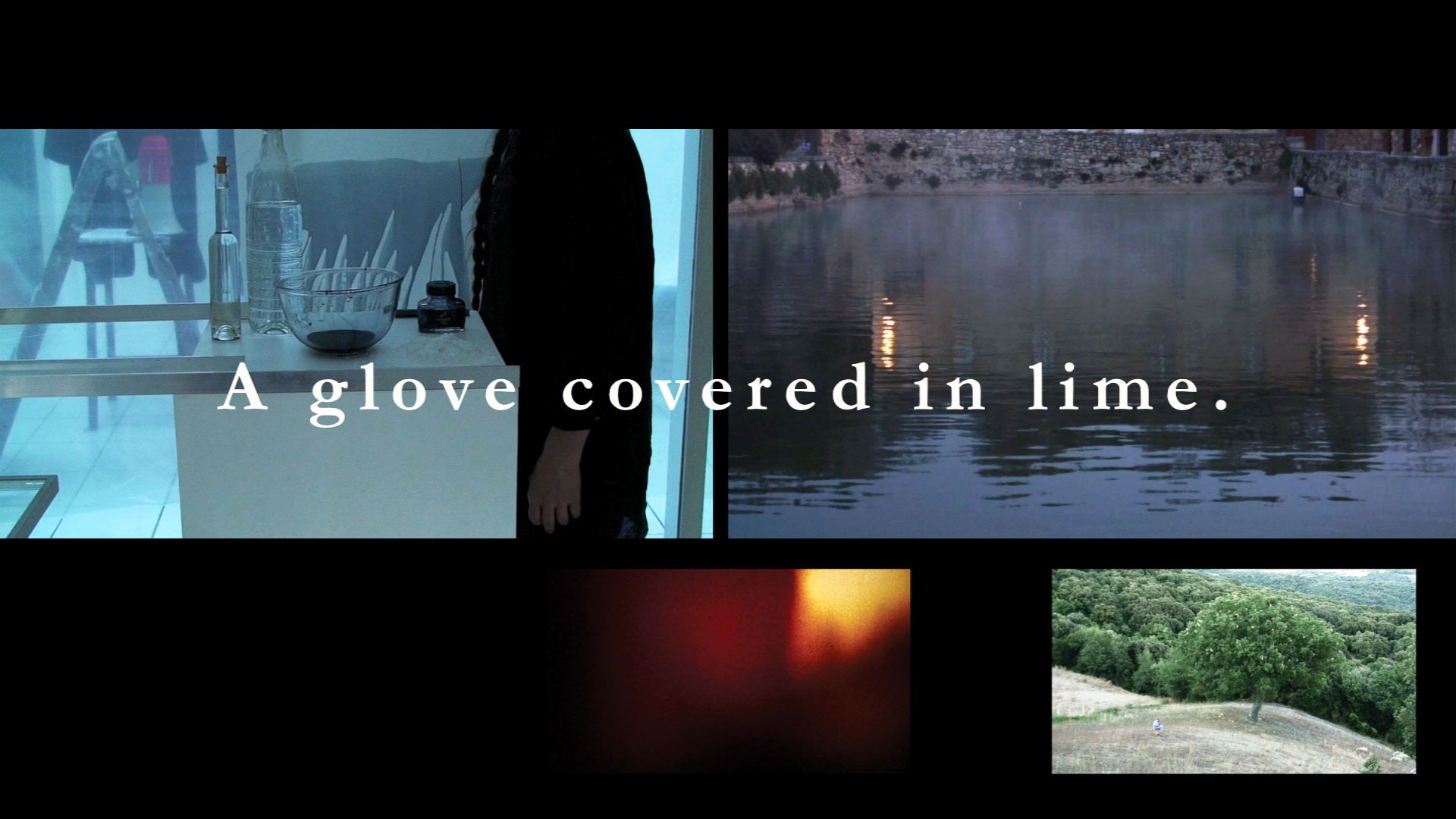
Experimental Writing @ Carroll / Fletcher: Kreider + O’Leary with Maria Fusco
Friday 18th March, 7.00pm
Carroll / Fletcher Gallery, 56-58 Eastcastle Street, London W1W 8EQ
Tickets: £5 from Carroll / Fletcher.
This will be a ticketed event. Booking information will be available soon via eventbrite.
This is the second event in the Experimental Writing @ Carroll/Fletcher series. Organised by the Institute for Modern and Contemporary Culture at University of Westminster and Carroll/Fletcher, the series showcases contemporary developments in experimental writing and their relationship to the visual arts.
Kreider + O’Leary will read from a selection of works including Falling (Copy Press, 2015) and the forthcoming Field Poetics (EROS Press, 2017). In addition, they will screen a selection of video work that is made in parallel to the text works. The reading/screening will be followed by a conversation between Kreider + O’Leary and writer and academic Maria Fusco.
Kreider + O’Leary are a poet and an architect who collaborate to make performance, installation and time-based media work in relation to sites of architectural and cultural interest. Since 2003, Kreider + O’Leary have made work in places such as prisons, military sites, film locations, landscape gardens, desert environments and more traditional gallery venues across the UK, USA, Europe, Australia, South America and Japan. Their work Light Vessel Automatic was exhibited at Performing Architecture at Tate Britain in 2013, Edge City was exhibited at the Lisbon Architecture Triennale in Lisbon in 2013 and their book Falling has recently been published by Copy Press (2015).
Maria Fusco is a Belfast-born writer based in Glasgow. Her work is published internationally and is translated into ten languages. She has just completed Master Rock, a new commission from Artangel & BBC Radio 4, which is a performance and radio broadcasts live inside a mountain on the west coast of Scotland. Maria writes fiction, critical and theoretical texts and edits publications. With A Bao A Qu Reading When Attitudes Become Form (Los Angeles/Vancouver: New Documents, 2013), The Mechanical Copula (Berlin/New York: Sternberg Press, 2011), is published in French as Copulation Mécanique (Paris: éditions ère, 2012). She is founder/editorial director of The Happy Hypocrite a semi-annual journal for and about experimental art writing, and a Reader at Edinburgh College of Art, University of Edinburgh.
For more information, please contact either Georgina Colby at g.colby@westminster.ac.uk or Asya Bachelis at asya@carrollfletcher.com
Introduction to the Gothic course at the British Library
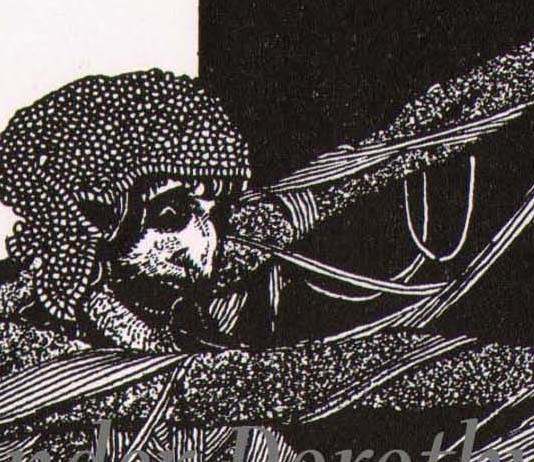
Emma McEvoy is teaching a special five-week Introduction to the Gothic evening course at the British Library, starting on Tuesday 5th April this year. Book a ticket now here!
The five-week course will introduce you to Gothic, from Horace Walpole’s seminal novel The Castle of Otranto (1764) to Daphne du Maurier’s Rebecca(1938). En route we’ll take in a novel by the ‘Shakespeare of romance writers’ Ann Radcliffe, Bram Stoker’s Dracula (1897), and short stories by Edgar Allan Poe and Nathaniel Hawthorne, amongst others. Gothic has never been solely a literary phenomenon and although our primary focus is on literature, we’ll also make reference to film, television series, architecture and painting.
You’ll also have the opportunity to view items from our collections such as Bram Stoker’s original playscript of Dracula, the beautifully illustrated edition of Walpole’s Description of Strawberry Hill, Victorian periodicals, first (and later) editions of the Gothic texts we’ll be discussing, and rare examples of the cheaply produced chapbooks of the 1790s.
The course is led by Dr Emma McEvoy, University of Westminster, with contributions from British Library curator Greg Buzwell.
See more here.
IMCC welcomes Duncan Forbes as new Research Fellow
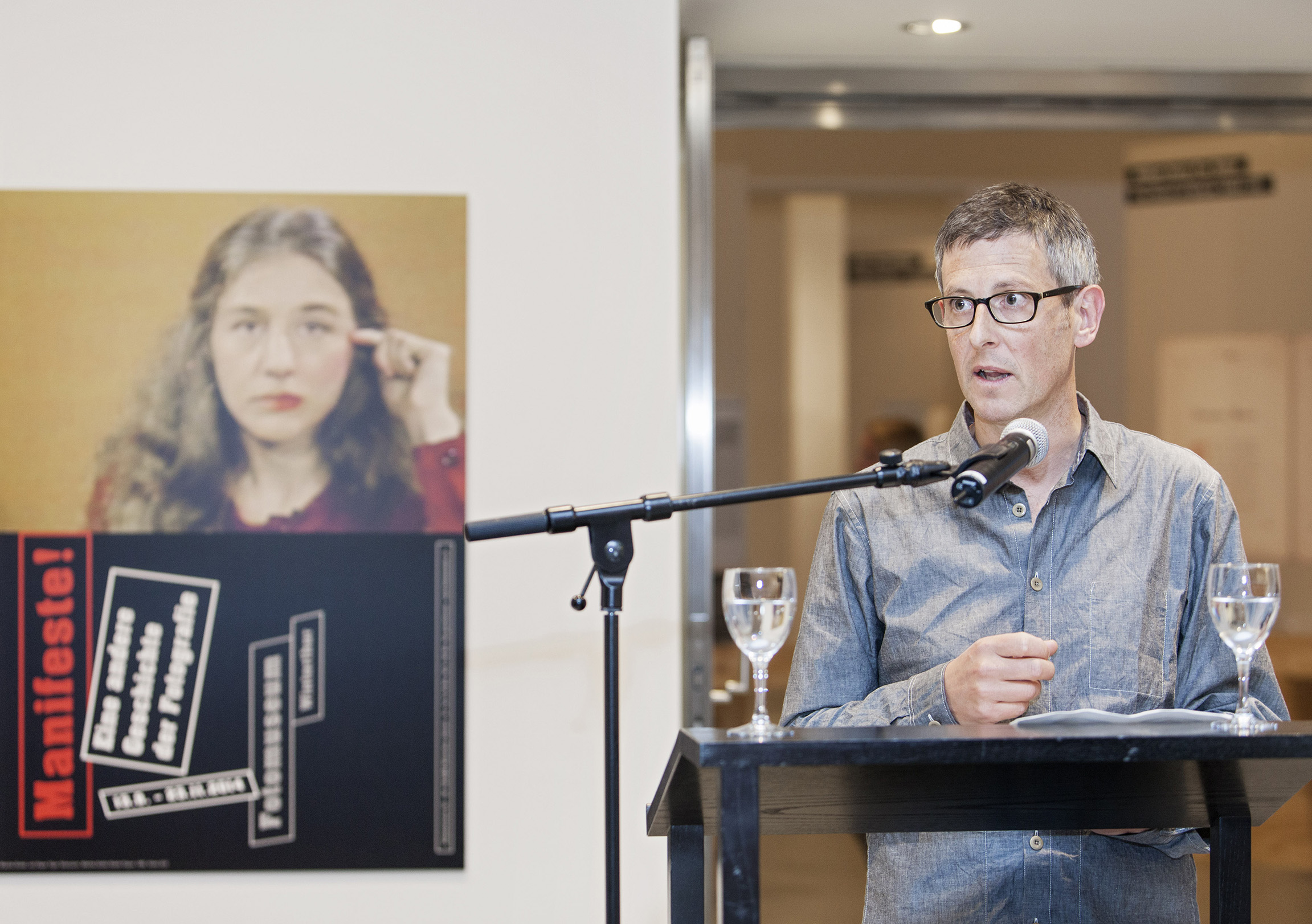
The IMCC is delighted to welcome Duncan Forbes, who is joining us as a Visiting Research Fellow in the Institute. Duncan is a curator and writer based in Los Angeles and London. He was formerly Director and Curator of Fotomuseum Winterthur and Senior Curator at the National Galleries of Scotland. A major figure in contemporary photographic history and theory, Duncan’s recent collaborative curatorial and publishing projects include Provoke: Between Protest and Performance: Japanese Photography 1960-1975 (Steidl, 2016), Beastly/Tierisch (Spector Books, 2015), Manifeste! Eine andere Geschichte der Fotografie (Steidl, 2014) and Edith Tudor-Hart: In the Shadow of Tyranny (Hatje Cantz, 2013).
Arthur Daemmrich on Crossing Boundaries
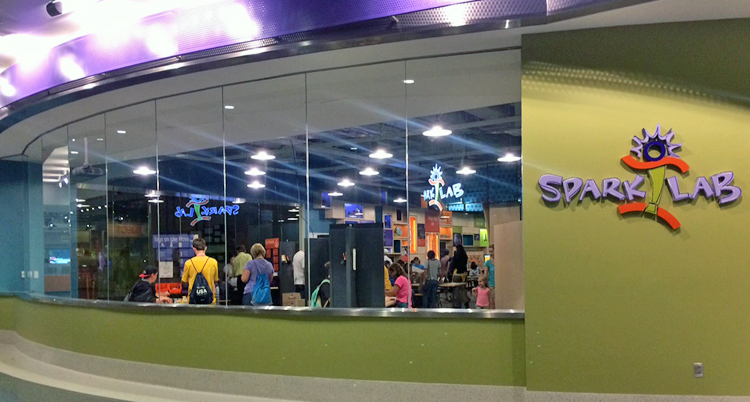
Wednesday 6th April 2016, 6.30pm
Fyvie Hall, University of Westminster, 309 Regent Street, London W1B 2HW
‘Crossing Boundaries: Promoting Innovation and Creativity’
Dr Arthur Daemmrich, Director of the Lemelson Centre, Smithsonian Institution
The Lemelson Center has led the study of invention and innovation at the Smithsonian in Washington DC since 1995. The Center’s activities advance scholarship on the history of invention, share stories about inventors and their work, and nurture creativity in young people. The Center is supported by The Lemelson Foundation and located in the National Museum of American History. The new Lemelson Hall of Invention and Innovation, opened on 1 July 2015, is a signature part of the Museum’s 45,000-square-foot Innovation Wing. The Hall is home to two exhibitions, “Places of Invention” and “Inventive Minds”, and includes the hands-on invention center Draper Spark!Lab.
Dr Daemmrich will give a special lecture on the work of the Lemelson, followed by a panel discussion with Tricia Edwards, Head of Education, Lemelson Center; Sharon Ament, Director, Museum of London; Stian Westlake, Executive Director, Policy and Research, NESTA. Chaired by Professor Alexandra Warwick, Head of Dept of English, Linguistics & Cultural Studies, University of Westminster.
RSVP and further information from Alan Morrison, Coordinator, Smithsonian-Westminster Colloquium, University of Westminster, morrisa1@westminster.ac.uk
The Iterative Turn seminar, Weds 2nd March 2016

Wednesday 2 March, 5.00 pm
Room 105, University of Westminster, 32-38 Wells Street, London W1T 3UW
‘The Iterative Turn’
Kaja Marczewska (Westminster), with a response by Steve Smith
A Post-Doctoral Fellow in the Institute, Kaja Marczewska will be giving a paper based on her current research with a response from Steve Smith. Drawing on debates about plagiarism and the state of copyright, Kaja’s paper investigates the implications of the increasing propensity to copy as a creative practice in contemporary culture and understands it as a cultural condition that triggers novel attitudes to creativity. By interrogating the restrictions of the dominant categories of originality and authorship, in legal and creative terms, the paper proposes the notion of iteration as a possible alternative for thinking about some representative creative practices characteristic of the contemporary moment.

